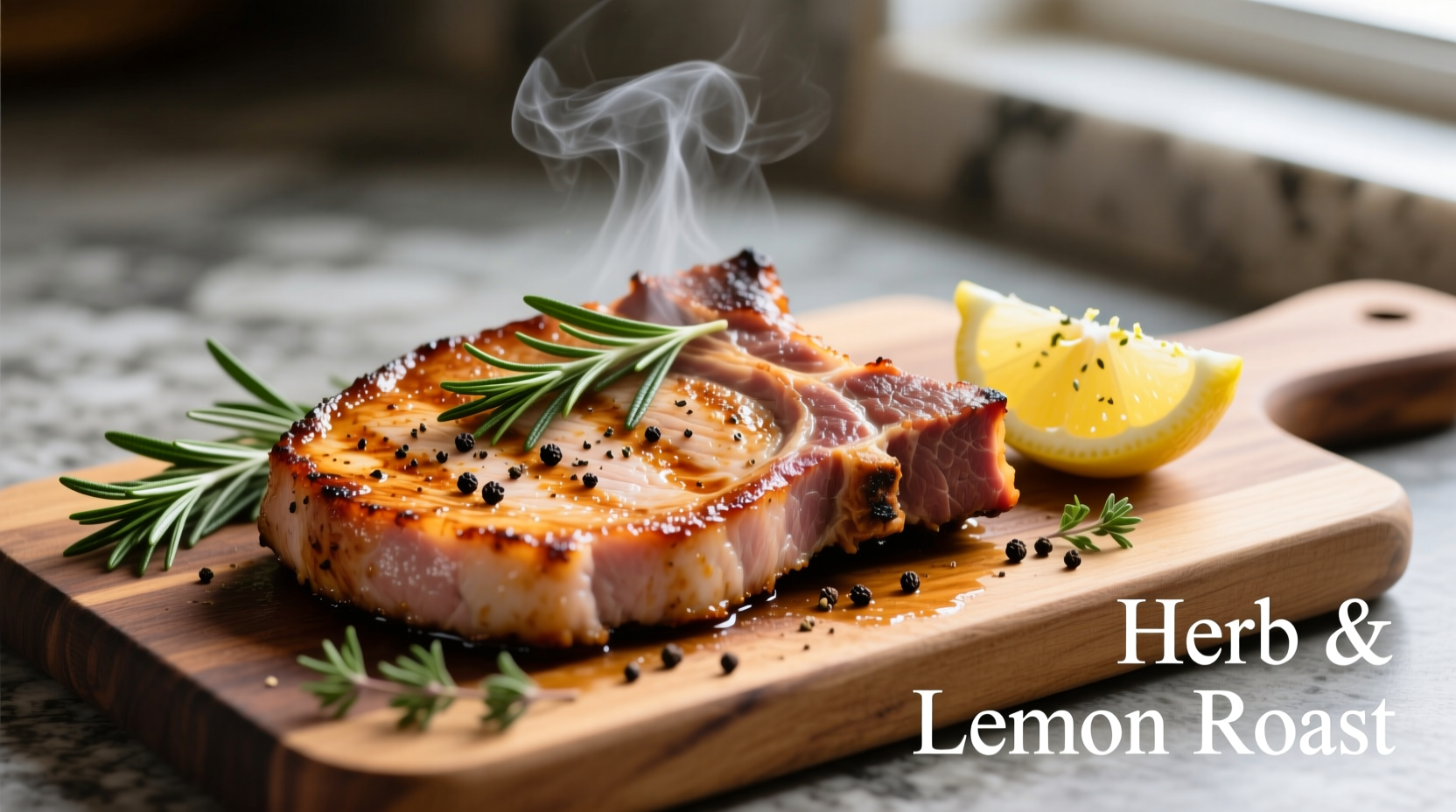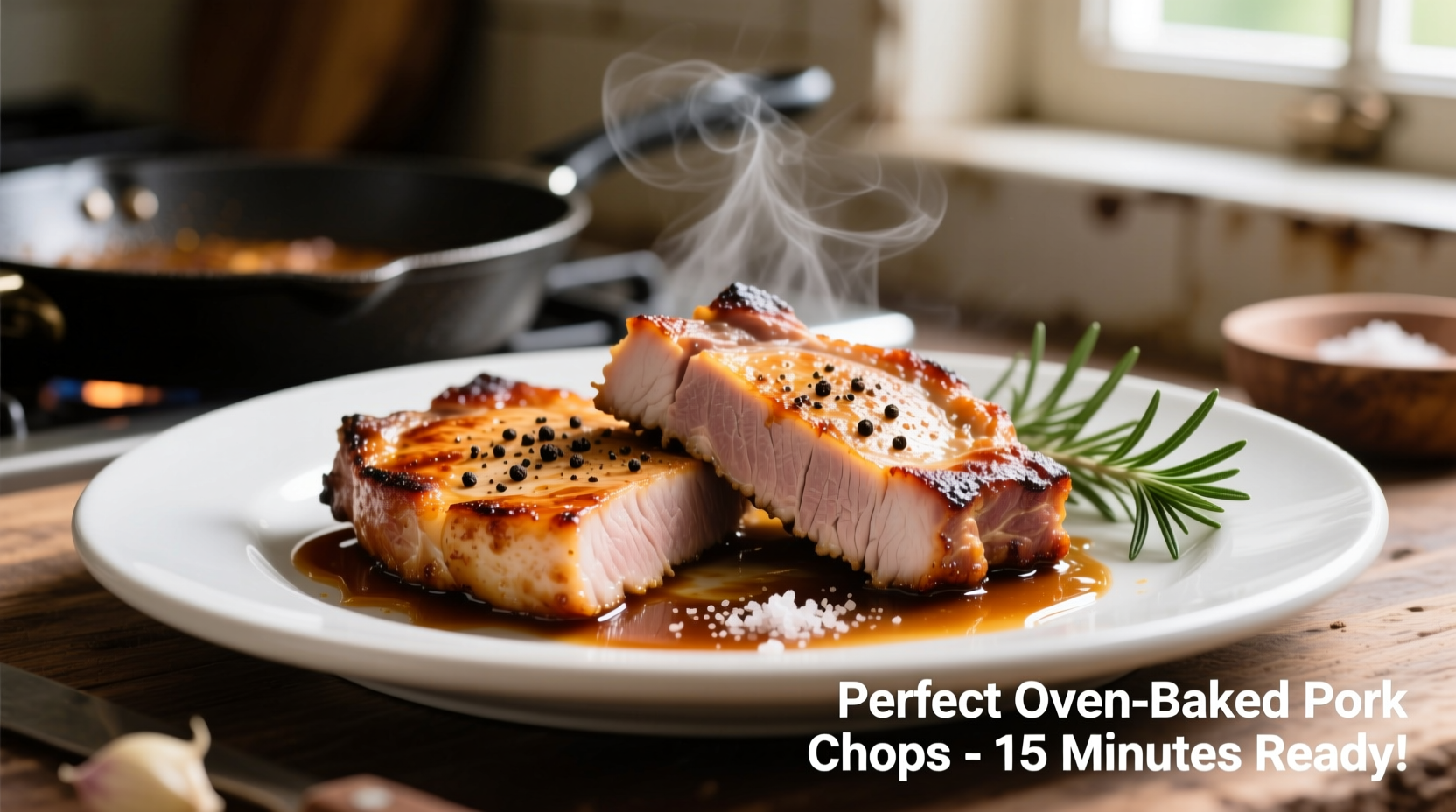Perfectly cooked thin pork chops in the oven require precise timing: bake at 400°F (204°C) for 12-15 minutes until internal temperature reaches 145°F (63°C). This method prevents drying while ensuring food safety per USDA guidelines. Rest for 5 minutes before serving for maximum juiciness.
Thin pork chops—typically under ¼ inch thick—present unique cooking challenges. Their minimal thickness means they cook rapidly but easily become dry or tough when mishandled. Professional chefs like Antonio Rodriguez emphasize that temperature control and timing precision separate successful results from disappointing meals. This guide delivers science-backed techniques refined through culinary experience to help you consistently achieve tender, flavorful pork chops.
Why Thin Pork Chops Demand Special Attention
Unlike thicker cuts, thin pork chops have less thermal buffer. The USDA Food Safety and Inspection Service confirms that pork must reach 145°F internally for safety, but thin cuts can overshoot this target in mere minutes. Protein denaturation begins at 140°F, causing moisture loss that accelerates dramatically beyond 150°F. This narrow window explains why many home cooks struggle with this cut.
| Cooking Stage | Temperature Range | Effect on Thin Pork Chops |
|---|---|---|
| Preparation | Room temperature | Ensures even cooking; prevents center from remaining cold |
| Cooking Start | 400°F (oven) | Rapid sear locks in juices before interior overcooks |
| Target Doneness | 145°F internal | USDA-safe with optimal moisture retention |
| Resting Period | 135-140°F | Allows juices to redistribute; temperature stabilizes |
Essential Preparation Steps
Bring chops to room temperature for 20-30 minutes before cooking. Cold meat placed directly in the oven creates uneven cooking—the exterior dries while the center catches up. Meanwhile, pat chops thoroughly dry with paper towels. Surface moisture creates steam instead of the desirable sear. Season generously with salt 15 minutes before cooking to enhance flavor penetration without drawing out excessive moisture.

Step-by-Step Oven Method
- Preheat oven to 400°F (204°C) with rack positioned in the center. Verify temperature with an independent oven thermometer—most built-in thermostats have 25°F+ variance.
- Prepare baking surface: Line a rimmed baking sheet with parchment paper or use an oven-safe wire rack over a baking sheet for optimal air circulation.
- Lightly oil chops (1 tsp vegetable or avocado oil per chop) to promote browning without adding moisture.
- Place chops on prepared surface with 1-inch spacing. Overcrowding creates steam pockets that prevent proper searing.
- Bake 12-15 minutes, rotating the pan halfway through for even exposure. Use an instant-read thermometer to check at 12 minutes.
- Rest 5 minutes tented loosely with foil. This critical step allows proteins to reabsorb juices that would otherwise escape during slicing.
Troubleshooting Common Issues
Dry or tough chops? Likely overcooked by just 60-90 seconds. Invest in a reliable instant-read thermometer—Thermapen-style devices provide readings in 3-4 seconds. Burnt edges but raw center? Your oven runs hot—reduce temperature to 375°F and extend time by 2-3 minutes. Uneven browning? Rotate the pan halfway through cooking and ensure proper spacing between chops.
Flavor Enhancement Techniques
Thin cuts benefit from bold but simple seasoning. Try these professional approaches:
- Dry brine: Sprinkle 1/4 tsp kosher salt per chop 15 minutes before cooking
- Aromatics: Place 2-3 smashed garlic cloves and fresh rosemary sprigs around chops
- Finishing touch: Drizzle with lemon juice and a teaspoon of high-quality olive oil after resting
Serving and Storage Guidance
Serve immediately after resting with complementary sides like roasted apples or sautéed greens. For leftovers, store in an airtight container within 2 hours of cooking. Reheat gently in a skillet over medium-low heat with a splash of broth to restore moisture—microwaving typically dries out thin proteins. Properly stored, cooked pork chops maintain quality for 3-4 days in the refrigerator.
Frequently Asked Questions
Can I cook frozen thin pork chops directly in the oven?
Yes, but adjust cooking time to 18-22 minutes at 400°F. Place frozen chops on a wire rack to ensure air circulation. Check temperature 5 minutes earlier than usual since frozen centers delay heat penetration. Never cook frozen chops in liquid as this creates uneven texture.
Why does my oven-cooked pork chop taste bland despite seasoning?
Thin cuts need seasoning time to absorb flavors. Apply salt at least 15 minutes before cooking—this allows penetration beyond surface level. For immediate cooking, mix 1/4 tsp salt with 1 tsp oil to create a paste that adheres better. Avoid liquid marinades which prevent proper browning.
How do I prevent thin pork chops from curling during baking?
Curling occurs when muscle fibers contract unevenly. Make 2-3 shallow diagonal cuts along the fat edge every inch to release tension. Alternatively, place a wire rack directly on top of chops during the first 5 minutes of cooking to weigh them down gently.
Is it safe to eat pork chops at 145°F?
Yes. The USDA updated pork safety guidelines in 2011, confirming 145°F with 3-minute rest time eliminates pathogens while preserving moisture. This differs from ground pork, which requires 160°F. Always verify with a calibrated thermometer—color alone doesn't indicate doneness.











 浙公网安备
33010002000092号
浙公网安备
33010002000092号 浙B2-20120091-4
浙B2-20120091-4